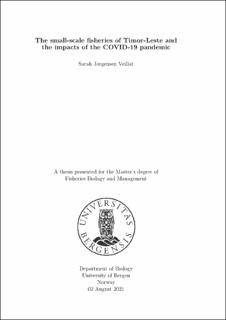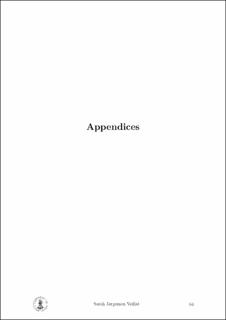| dc.description.abstract | Small-scale fisheries (SSFs) of developing countries are an important yet neglected part of the world’s capture fisheries. The general lack of fisheries dependent and independent data makes it difficult to predict the impact of future crises on SSFs, and thus to prepare for them. This research focusses on the SSF of the small island developing state Timor-Leste. Timor-Leste is a newly independent country, with a still underdeveloped fishery. WorldFish, a non-profit research organisation based in Penang, carries out projects that focus on promoting the fish production of the country to combat malnourishment. One of the ongoing projects is a new catch and effort monitoring program that has been active since 2016. This thesis will be the first to explore and analyse this dataset to give a descriptive analysis of the SSF of Timor-Leste. Simultaneously, the data is used to examine the possible impact of the COVID-19 pandemic, to give insight on how the fisheries cope under the pressure of such a health emergency. The SSF of Timor-Leste has the characteristics of a typical small-scale fishery, having small inshore boats and crews and catching multiple species. The climate and other occupations such as agriculture determine the seasonality pattern of the fisheries. The catch is sold locally and what cannot be traded is kept for own consumption. The results suggest that the SSF of Timor-Leste is quite resilient against the COVID-19 crisis. While experiencing a decline in the market value of the catch, it does not appear to have been as impactful as in other SSFs, where a decrease in fishing effort has been measured as well. It is possible that the limited export and modest tourism sector of Timor-Leste have sheltered the fisheries from enduring the same shock that other SSFs have. It will thus be important to put a significant amount of effort into preserving the resilience of the fisheries when promoting and developing the sector. This thesis contributes to filling the data gap present of small-scale fisheries, and hopefully incites an increase of descriptive analyses of SSFs. | |

